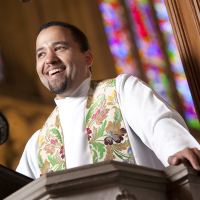All of this talk about the life of the preacher as a life of worship does not negate the importance of what the preacher proclaims with his or her lips.
Thinking about preaching through a doxological lens highlights the person of the preacher but what is proclaimed is still significant. The sermon itself is not unimportant.
Rather, this lens of worship suggests that the sermon itself, a creation of the worshipping preacher, is also an offering of worship. The sermon is an extension of the preacher’s life of worship. The sermon is a prayer. A sermon may be viewed as many things but through a doxological vision, it is an act of worship for God to others. The sermon is for God. Barth is helpful again in this case because he declares, “The sermon must certainly be worship, but as a whole and not merely at the end.”1
The entire sermon process is worship. The effort and care invested into the biblical, hermeneutical, theological, cultural, and rhetorical substance of any sermon is ultimately for the glorification of God, or at least it should be. Preaching as liturgical theology has as its highest goal doxology.
In a sense, preaching’s essence and end is Eucharistic in nature, leading people in the pulpit and pew toward thanksgiving of God for God’s goodness and grace. This suggests that worship should be the goal of not only the preacher but the congregation. A sermon is a ministry of worship that hopefully sparks others’ worship. “For the intention of God’s works is not that they should happen, but that they should awaken joy and thanksgiving, and the song of praise that return to God.”2
A sermon should lead others to return praise to God. Viewing the sermon as worship means spiritually forming a congregation to live out their doxological calling in praise. This conception of a sermon or preaching as worship links with the history of preaching. Richard Lischer writes, “In the ecclesiastical Latin of the fourth century, four hundred years before it was exclusively associated with preaching, praedicare meant ‘to praise,’ ‘to celebrate.'”3
Preaching is a task of praise and celebration for the preacher and the congregation. The sermon is a liturgy of delight though this may not always be the end result of a sermon. One has to admit that some sermons can be detrimental to a congregation’s spiritual health. Yet, maintaining praise, delight, and joy as the core of the gospel or good news proclaimed may help us remember the One who we proclaim and move us in the direction of countercultural proclamation.
“We do not proclaim ourselves” (2 Corinthians 4:5) but “Christ crucified” (1 Corinthians 1:23), the reason for any sermonic good news. Jesus Christ is the reason for celebration but his crucifixion is also a cause for lament, another stance of worship that one can include in a sermon. To say that a sermon is worship does not mean everything that is proclaimed is good news or joyous.
In fact, in dealing with society’s context in our preaching, we are bound to lament the plight of the world with all of its suffering and pain; but, lament, like in the Psalms, is performed as worship before God in the face of God. To celebrate apart from lament or vice versa is insufficient for the full expression of the Spirit of worship in preaching.4 This affirms what Mary Catherine Hilkert argues, “Whether in the mode of thanks and praise or of lament, preaching is a calling on the mystery of the transcendent God who alone can save us.”5
Turning to God (i.e. conversion) or calling on God in preaching through praise or lament is what makes a sermon doxological. In both celebration and lamentation, God is glorified and this should be our ultimate aim when we preach. Soli Deo Gloria!
1Karl Barth, Homiletics, trans. Geoffrey W. Bromiley and Donald E. Daniels (Louisville: Westminster John Knox Press, 1991), 127.
2Jurgen Moltmann, The Spirit of Life: A Universal Affirmation, trans. Margaret Kohl (Minneapolis: Fortress Press, 1994), 299.
3Richard Lischer, A Theology of Preaching: The Dynamics of the Gospel (Nashville: Abingdon Press, 1981), 26.
4For more about the relationship between lament and celebration in preaching, see my forthcoming book, Spirit Speech: Lament and Celebration in Preaching (Nashville: Abingdon, 2009).
5Mary Catherine Hilkert, Naming Grace: Preaching and the Sacramental Imagination (New York: Continuum, 1997), 193-194.

